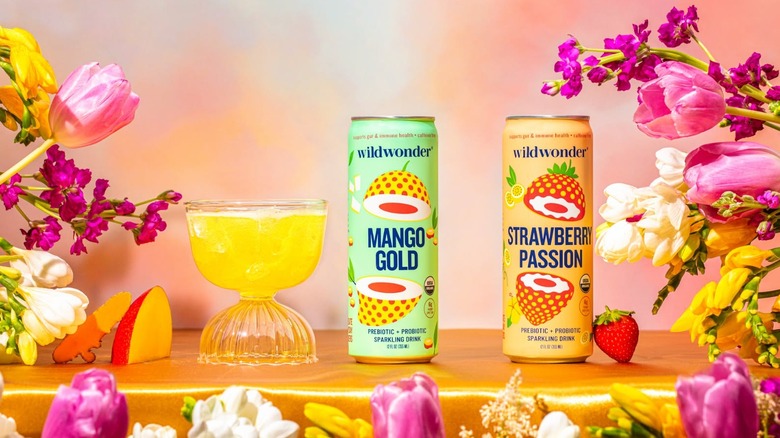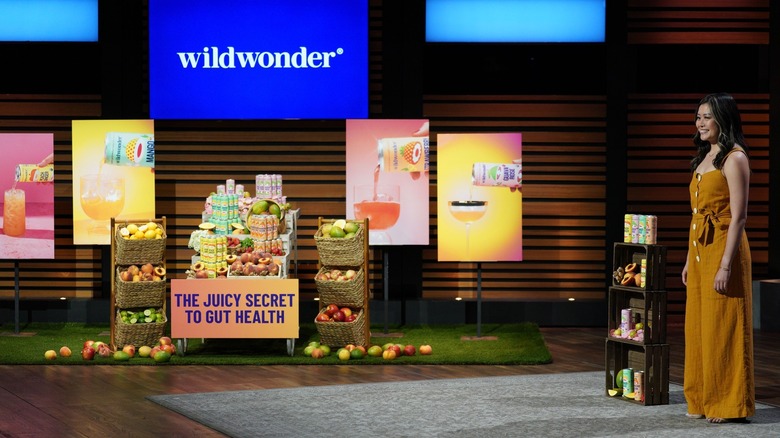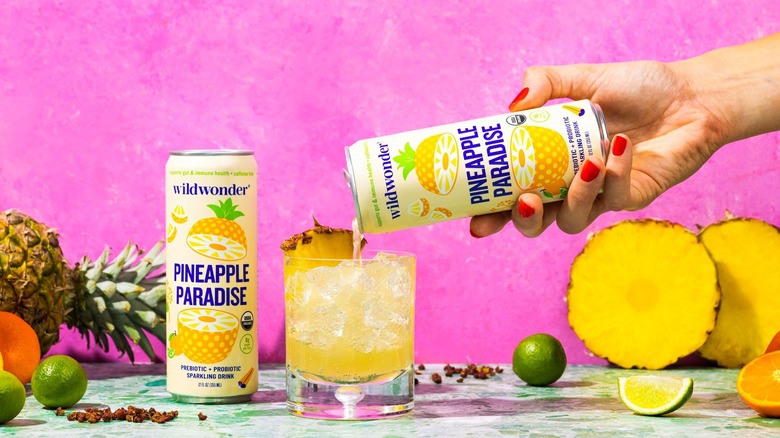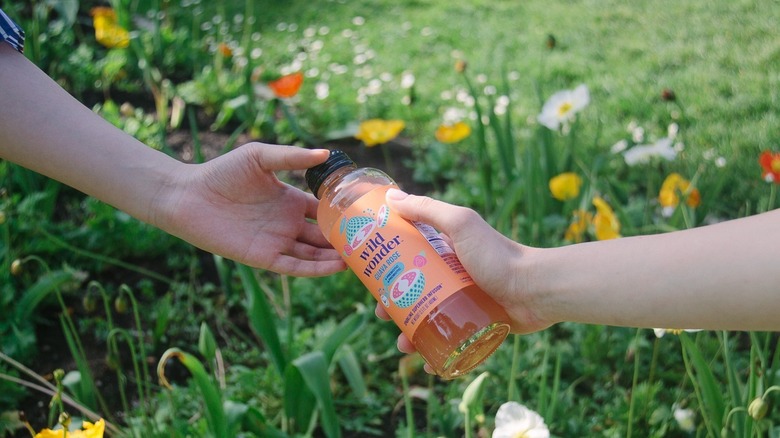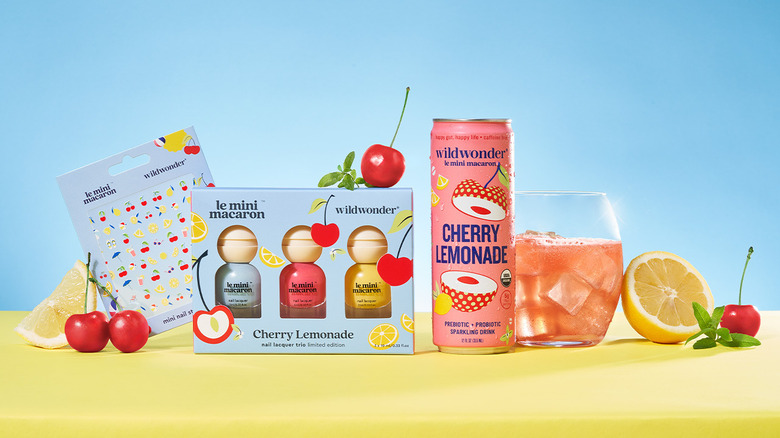Whatever Happened To Wildwonder From Shark Tank?
Rosa Li launched Wildwonder from a blend of personal and cultural inspiration, but "Shark Tank" helped the brand break wide open. Li grew up in China where she was raised by her grandparents until she was 12 years old when she moved to the States with her parents. Her inspiration for this product came after working several stressful jobs where she started to feel the effects in her gut.
Li remembered the tonics her grandmother made with wild herbs which were soothing and uplifting, so she created a line of sparkling prebiotic and probiotic beverages, lauding them as a fresh alternative to sugary sodas and vinegary kombuchas. In her pitch, she presented flavors like Strawberry Passion, Peach Ginger, Mango Gold, and Guava Rose; highlighting their clean labels (USDA Organic, vegan, gluten-free), six grams of sugar, and 1 billion live probiotics per can.
Rosa's credentials as a Stanford MBA with a finance background at Goldman Sachs added credibility, even if there was some fear she'd have a hard time breaking into a market where there are already so many wellness drinks out there. Her story was definitely inspiring, particularly her ability to navigate the setbacks of the COVID-19 pandemic.
Though the Sharks liked the product, some balked at the valuation and felt as though the industry was far too tough to break into. In the end, Tony Xu, a former classmate of Rosa, countered her original offer of $500,000 for 5%, with $500,000 for 9%. Rosa negotiated the deal to 5% equity plus 3% advisor shares. And just like that, she had a deal. Wildwonder was on its way.
What happened to Wildwonder on Shark Tank
Rosa Li's pitch on "Shark Tank" in Season 14 was solid. She strutted into the Tank confident, cans in hand, pitching Wildwonder as the first sparkling prebiotic and probiotic beverage which made it a gut-health drink that sidesteps kombucha's off-putting vinegar taste and soda's sugar crash. She claimed that Wildwonder contained 90% less sugar than soda and 50% less than kombucha. One can had just 6 grams of sugar, 35 calories, 1 billion live probiotics, and 5 grams of prebiotic fiber; instantly positioning Wildwonder as both functional and delicious.
The Sharks' initial reaction was warm. They visibly nodded, sipped, and enjoyed the drink. Mark Cuban expressed interest in becoming a customer himself, admitting he could drink the Strawberry Passion flavor all day long. Rosa pegged Wildwonder at $10 million with a $1.1 million revenue run rate and boasted about how she was in 100 stores including her region's Whole Foods. Kevin O'Leary questioned the valuation's realism and pointed out that 100 stores was nothing when you considered the competition. He bowed out.
Barbara Corcoran cited her drink investment history, highlighting that she'd lost money both times and didn't want to risk taking another hit. Lori Greiner and Mark Cuban ultimately opted out for similar reasons as O'Leary. That left Tony Xu. And while he mentioned that he shared the same sentiments as the other Sharks, he was willing to take a chance on Wildwonder. He admitted that he wasn't a beverage guy, but figured Li would benefit from his understanding of capital-efficient growth. Li countered, he agreed, and the deal closed on-air.
Wildwonder after Shark Tank
The aftermath of going on "Shark Tank" for Wildwonder was immediate and dramatic. Rosa Li reported that the exposure she received from the show was unreal, earning in one month what it typically took a year to make after the episode aired. That was a promising start to fuel Wildwonder into multiple projects and product expansions.
Shortly after the show, Wildwonder expanded retail reach with major partners. It was stocked in over 1,300 Sprouts and Fresh Market locations across the country by 2023. The brand rolled out a new Pineapple Paradise flavor as well as Raspberry Lychee and boosted production capacity to meet surging demand. It seems that Li is on pace with her goal of creating one new product annually. Her company grew by 400% year to year, and in 2023, Google chose Wildwonder to replace the kombucha in its communal office fridge. Once you get a deal with a Shark, it's your chance to shine. Luckily, Rosa Li didn't shy away from the spotlight.
Is Wildwonder still in business?
Wildwonder is definitely still in business and Rosa is killing it. The company's LinkedIn, boasting over 13,000 followers, recently announced a major milestone — availability in Target's refrigerated aisles nationwide including key markets like Seattle, Chicago, Dallas, Houston, Austin, and the Bay Area; indicating serious retail growth. This move built on its earlier wins in Sprouts and Fresh Market and came in the wake of a rollout in 160 Target stores in Southern California in 2022.
On Instagram, Wildwood has been releasing fresh flavors like Cherry Lemonade, which then launched at high-end natural grocers including Erewhon, Central Market, and Bristol Farms. Meanwhile, a recent BevNET announcement confirmed its expansion into Whole Foods Market nationwide as of January 2025.
Wildwonder's early retail traction was validated by strong internal growth, including quadrupling its production capacity in early 2023 and recognition as the fastest-growing natural products brand in multi-outlet American chains. It also gained awards like Inc. Magazine's Female Founder 250 and a Women's Health taste-test win for Strawberry Passion.
The bottom line is that Wildwonder continues growing through new retail channels, fresh flavors, increasing production, consumer education regarding probiotics and prebiotics, and industry accolades. Rosa Li is very active, continuing to find ways to connect with consumers, and updating the company's social media accounts regularly to keep the public informed about all the changes at Wildwonder.
What's next for Wildwonder?
Beyond new flavors, Wildwonder is exploring different product formats and industry events are next on the agenda. Rosa has plans to showcase Cherry Lemonade at events like NAMA Vegas, spotlighting its presence to potential retail partners, which is a smart business development move.
Brand strategy is important and collaborating with other business owners (particularly female-led companies) is at the forefront of Li's roadmap for Wildwonder. One of its most fun moves is a playful collab with Le Mini Macaron. Celebrating AAPI Heritage Month, they teamed up for a limited-edition Cherry Lemonade nail polish trio, complete with stickers and a matching drink flavor, both of which dropped May 1. It's a fun expansion of the brand and a nod to founder Rosa Li's vision of joy from the inside out.
Other initiatives setting the stage for the future is Li's determination to make a difference. The brand donates 5% of its profits to organizations that support marginalized communities, particularly women and underserved entrepreneurs. And it's not some tacked-on feel-good initiative, either. The founder has made it abundantly clear this is a part of the company's mission.
Whether through financial contributions, collaborations with like-minded organizations, or spotlighting underrepresented voices, the brand ensures that every bottle sold supports more than just gut health. It's a way of turning wellness into a ripple effect, nourishing individuals while also creating opportunity and equity in the broader community.
